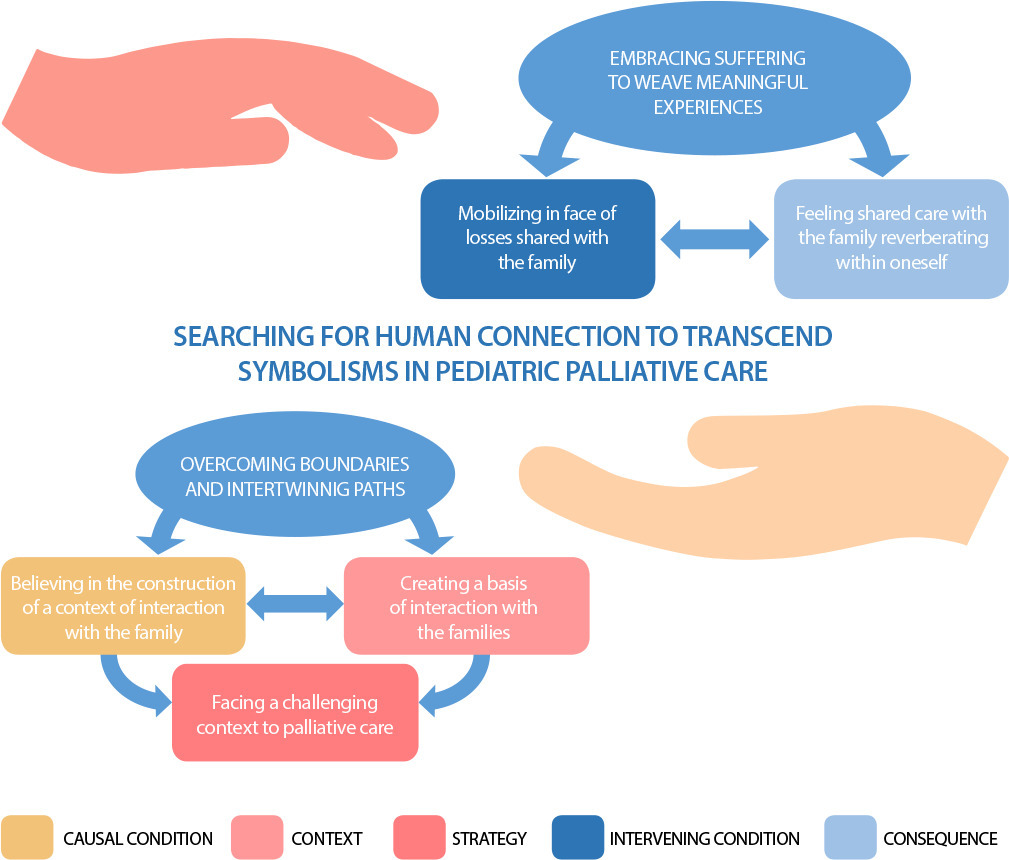-
ORIGINAL ARTICLE
Assessment of the Psychosocial Care Center multidisciplinary team from users’ and family members’ perspective
Revista Brasileira de Enfermagem. 2023;76(3):e20220645
08-21-2023
Resumo
ORIGINAL ARTICLEAssessment of the Psychosocial Care Center multidisciplinary team from users’ and family members’ perspective
Revista Brasileira de Enfermagem. 2023;76(3):e20220645
08-21-2023DOI 10.1590/0034-7167-2022-0645
Visualizações0ABSTRACT
Objectives:
to assess the multidisciplinary team of a Psychosocial Care Center I from users’ and family members’ perspective.
Methods:
an evaluative study, anchored in the fourth generation evaluation theoretical-methodological framework, carried out in a Psychosocial Care Center I, from September 2021 to March 2022. Eleven users and 06 family members participated. Data were collected through non-participant observation, individual interviews and negotiation sessions, and analyzed using the Constant Comparative Method, using the MAXQDA software.
Results:
the team develops its care based on individual and collective care, with integrated and complementary work by professionals. They seek to facilitate treatment initiation and continuation, considering health needs and offering support, understanding and guidance to users and their families.
Final Considerations:
the multidisciplinary team’s work is based on the psychosocial paradigm, which can qualify care and strengthen the service role in the mental health network.
Palavras-chave: Health Services EvaluationMental DisordersMental Health ServicesPatient Care TeamProfessional-Family RelationsVer mais
-
ORIGINAL ARTICLE
Searching for human connection to transcend symbolisms in pediatric palliative care
Revista Brasileira de Enfermagem. 2023;76(3):e20220476
06-26-2023
Resumo
ORIGINAL ARTICLESearching for human connection to transcend symbolisms in pediatric palliative care
Revista Brasileira de Enfermagem. 2023;76(3):e20220476
06-26-2023DOI 10.1590/0034-7167-2022-0476
Visualizações0Ver maisABSTRACT
Objectives:
to present a theoretical model for the interactional context of health professionals and families of children and adolescents under palliative care.
Methods:
qualitative study based on the theoretical frameworks of Grounded Theory and Symbolic Interactionism. Ten palliative care professionals took part in this study through semi-structured interviews employing snowball technique from 2020 to 2021.
Results:
the comparative data analysis resulted in the theoretical model “Searching for human connection to transcend symbolisms in pediatric palliative care”. It reveals symbolic elements that substantiate the construction of a collaborative context integrating two phenomena: “Overcoming boundaries and intertwining paths” and “Embracing suffering to weave meaningful experiences”. Symbolisms in palliative care guide the behavior of families and professionals, which makes them the key factor to be managed.
Final Considerations:
symbolisms and suffering continually integrate the interactional experience of professionals. Empathy and compassion are fundamental elements to enable their connection with families.

-
ORIGINAL ARTICLE
Medication reconciliation in pediatrics: a validation of instruments to prevent medication errors
Revista Brasileira de Enfermagem. 2023;76(2):e20210755
03-06-2023
Resumo
ORIGINAL ARTICLEMedication reconciliation in pediatrics: a validation of instruments to prevent medication errors
Revista Brasileira de Enfermagem. 2023;76(2):e20210755
03-06-2023DOI 10.1590/0034-7167-2021-0755
Visualizações0ABSTRACT
Objectives:
to develop and validate the content of two instruments for promoting medication reconciliation for the transition of care of hospitalized children.
Methods:
methodological study, conducted in five stages: scope review for conceptual structure; elaboration of the initial version; content validation with five specialists using the Delphi technique; reassessment; and construction of the final version of the instruments. A content validity index of at least 0.80 was adopted.
Results:
three rounds of evaluation were carried out to reach the validity index of the proposed contents, whereas a new analysis of 50% of the 20 items of the instrument aimed at families, and 28.5% of the 21 items aimed at professionals was necessary. The instrument aimed at families reached an index of 0.93, and the instrument for professionals, 0.90.
Conclusions:
the proposed instruments were validated. It is now possible to proceed with practical implementation studies to identify their influence on safety during medication reconciliation at transition of care.
Palavras-chave: Medication errorsMedication ReconciliationPatient SafetyPediatricsProfessional-Family RelationsVer mais
-
ORIGINAL ARTICLE
Stomized children care practices: narratives of relatives
Revista Brasileira de Enfermagem. 2020;73(2):e20180370
03-30-2020
Resumo
ORIGINAL ARTICLEStomized children care practices: narratives of relatives
Revista Brasileira de Enfermagem. 2020;73(2):e20180370
03-30-2020DOI 10.1590/0034-7167-2018-0370
Visualizações0ABSTRACT
Objectives:
to understand the practices adopted by relatives regarding ostomized children care.
Methods:
qualitative approach, conducted with 11 relatives of ostomized children. Methodological framework was used as narrative technique; NVivo® software for data categorization and information analysis; content analysis technique.
Results:
participants revealed unpreparedness in dealing with children, lack of knowledge about handling materials and equipment inherent to ostomy and challenges faced in the daily life of children in school. They are unanimous in telling they feel encouraged and strengthened by receiving support from nurses in child care. They suggested the development of strategies to guide ostomized children care, such as educational material use.
Conclusions:
to understand family members’ experience made it possible to support training and qualification of nursing professionals, and to establish priorities in care. Evidence found may contribute to reflections that aid health promotion and prevention of complications in ostomized children care.
Palavras-chave: Health EducationNursing CareProfessional-Family RelationsQualitative ResearchSoftwareVer mais -
PESQUISA
Mother recognition in the Neonatal Intensive Care Unit
Revista Brasileira de Enfermagem. 2015;68(2):228-234
01-01-2015
Resumo
PESQUISAMother recognition in the Neonatal Intensive Care Unit
Revista Brasileira de Enfermagem. 2015;68(2):228-234
01-01-2015DOI 10.1590/0034-7167.2015680207i
Visualizações0ABSTRACT
Objective:
analyze the maternal experience in a neonatal intensive care unit, focusing on relations of recognition.
Method:
a qualitative study, built on the perspective of Gadamer’s hermeneutics, based on Honneth’s concept of recognition. In-depth interviews were conducted with 10 mothers of children admitted to a neonatal intensive care unit.
Results:
failures were reported in the process of mother recognition in the unit, with consequent feelings of insecurity and obligation to child care, resulting in fragility of self-esteem.
Conclusion:
interactions with health professionals in the NICU and its standards and protocols cause vulnerabilities and affect maternal recognition and autonomy.
Palavras-chave: Humanization of AssistanceIntegrality in HealthIntensive CareNeonatalProfessional-Family RelationsVer mais



